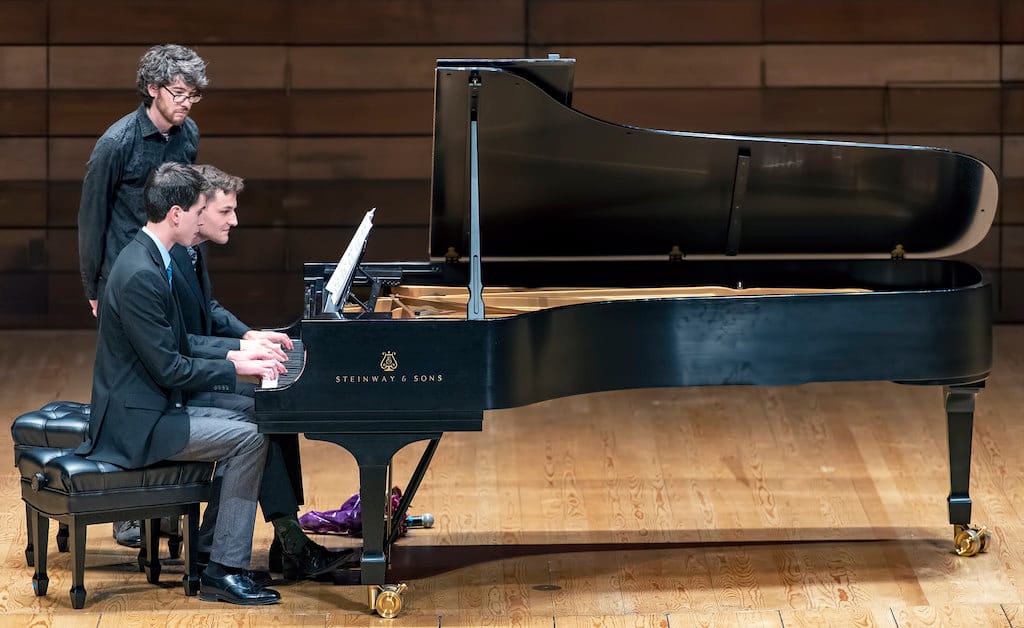The Page-Turner

No, I’m not referring to gripping pulp fiction novels but to the “person employed to turn sheet music pages for a soloist or accompanist, often a pianist, usually during a performance.”
In the last few concerts I’ve been to that feature a pianist, the performers have either turned their own pages (if they needed the score at all) or increasingly, have begun using foot-pedal operated mechanical page turners (as if pianists didn’t have enough pedals to deal with already!)
The mechanical device must be a godsend to the busy pianist, eliminating the need to find an able and willing person to turn pages.
But it is the end of an era. The cheaper and more accessible these devices become, the less you’ll see a human page-turner sitting at the left of the pianist in a performance, and periodically standing up and leaning over to do their task.
I must have been twelve or thirteen the first time I assumed this role. I had turned up to listen to a concert, when it was suddenly realised that a page-turner was needed. So I was a last-minute fill-in, and remember not being too pleased about it.
So at concerts after that, when authoritarian figures began scouring the audience looking for a page-turner, I’d try to make myself as invisible as possible, sinking into my seat. Sometimes I succeeded, more often I didn’t.
But over time, I began to quite enjoy the task. In many ways, it’s the best seat in the house. You’re right there on stage, in the heat of all the action. You by definition and necessity have to follow the score as the music unfolds. That in itself is such a revelation and privilege. You can not only see the pianist’s fingerwork and footwork, but you can hear her literally ‘breathe’ the music. If there are more performers on stage, you’re much closer to the musical conversation. You’re a de facto ‘performer’ yourself, just as much as is a prompter in a play.
It’s also a great way to get to know a visiting musician, not just socially but their idiosyncrasies on and off-stage. You see them at their best and worst. I’ve page-turned for some genial giants as well as irascible ingrates. Some pianists were extremely appreciative after a concert without page-turn mishaps, while others forgot all about you after the final page-turn.
Page-turning isn’t as easy as it looks. You have to be able to read a piano score at the very least. But you also have to be alert, almost as if you are performing the piece yourself, reading ahead of the music along with the performer. Some wish you to turn at the actual page-turn, others would like it a few measures before as they’ve memorised the ‘bridge’ between the two pages. An extremely quick passage can go by in a flash. And then, if there’s a ‘repeat’, you have to be able to peel back the requisite number of pages in one fell swoop. A page too many or too few could be disastrous. ‘Dog-ear’-ing the page-turns usually works but despite everything, accidents do happen.
I remember one instance just some years ago when we were organising a chamber music recital. I offered the pianist a page-turner, but she said she could manage it herself. But in the middle of a movement, the dreaded thing happened: she turned, but to the wrong page. The music halted and had to resume again.
Some pianists aren’t too fussy about the choice of page-turner, while others will insist on at least a few pre-concert ‘dry runs’. Most will give you a visual cue, a vigorous nod, to signal a page-turn.
It is equally important to know when not to turn; the reason for this could range from a lull in the music where the pianist prefers to do the page-turn herself, or if a section needs to be repeated.
Danish-American comedian and pianist Victor Borge has a hilarious sketch illustrating what ought not to happen and what can go wrong while page-turning.
I wasn’t at all surprised to read that many acclaimed concert halls even have a roster of experienced turners on stand-by for high-profile concerts. It’s not exactly a profession, but reliable page-turners are well compensated for their time in such institutions.
All in all, it’s a thankless job. When the performers take a bow at the end of a piece, the poor page-turner stays seated in place. At the end of the concert, amid thunderous applause for the musicians, the page-turner quietly slinks off into the wings.
Unobtrusiveness is almost a pre-requisite for a good page-turner. A page-turn ‘malfunction’ will always stick in the memory of the audience, but the musicians receive all the credit for a good performance (which actually is due at least in some part to seamless page-turning).
A British conductor once told me of his own page-turning embarrassment. As a young boy, he became quite infatuated with the pianist whose pages he was deputed to turn. He got so lost in his boyish daydreams that he completely missed her frantic cue to turn the page. She was experienced enough to carry on playing while turning it herself, but she wasn’t amused.
I know of at least one romance in India several decades ago that was sparked by page-turning, involving a visiting German pianist and young aspiring piano student assigned to turn his pages. She turned his head as well. I’m sure there must be many more such instances.
YouTube has some examples of true page-turning heroism, where the page-turner really should have received applause for going far beyond the call of duty. In one case, the music slipped into the innards of the grand piano in the middle of a page-turn but the pianist valiantly soldiered on from memory while the page-turner ‘surgically’ extracted it. In another case, the violinist’s and pianist’s score each took ‘turns’ (pardon the pun) in misbehaving, but again the page-turner saved the day.
I’ve not been present at such epochal moments in performance history, but I have witnessed the same page-turner sort out page-turns for a trio of musicians. It’s hard to be unobtrusive in such a situation.
I’ve so far not had personal experience with a digital page-turning device, but I know musicians who love them. However, when I read about them, I encounter concerns about battery life, low visibility, and “page-freeze.”
So with these devices, are we only substituting the possibility of human error with mechanical unpredictability?
Although some have predicted that “the death of the page-turner will be like the death of the typewriter: bloodless and swift”, I think it’s an overstatement. But human page-turners are already becoming rarer thanks to technology.
So my advice to young music students would be: Don’t ‘turn’ (okay, last ‘turn’ pun, I promise!) down an opportunity to be a page-turner. You’ll learn so much, and you’ll love every moment of it.
This article first appeared in The Navhind Times, Goa, India.





